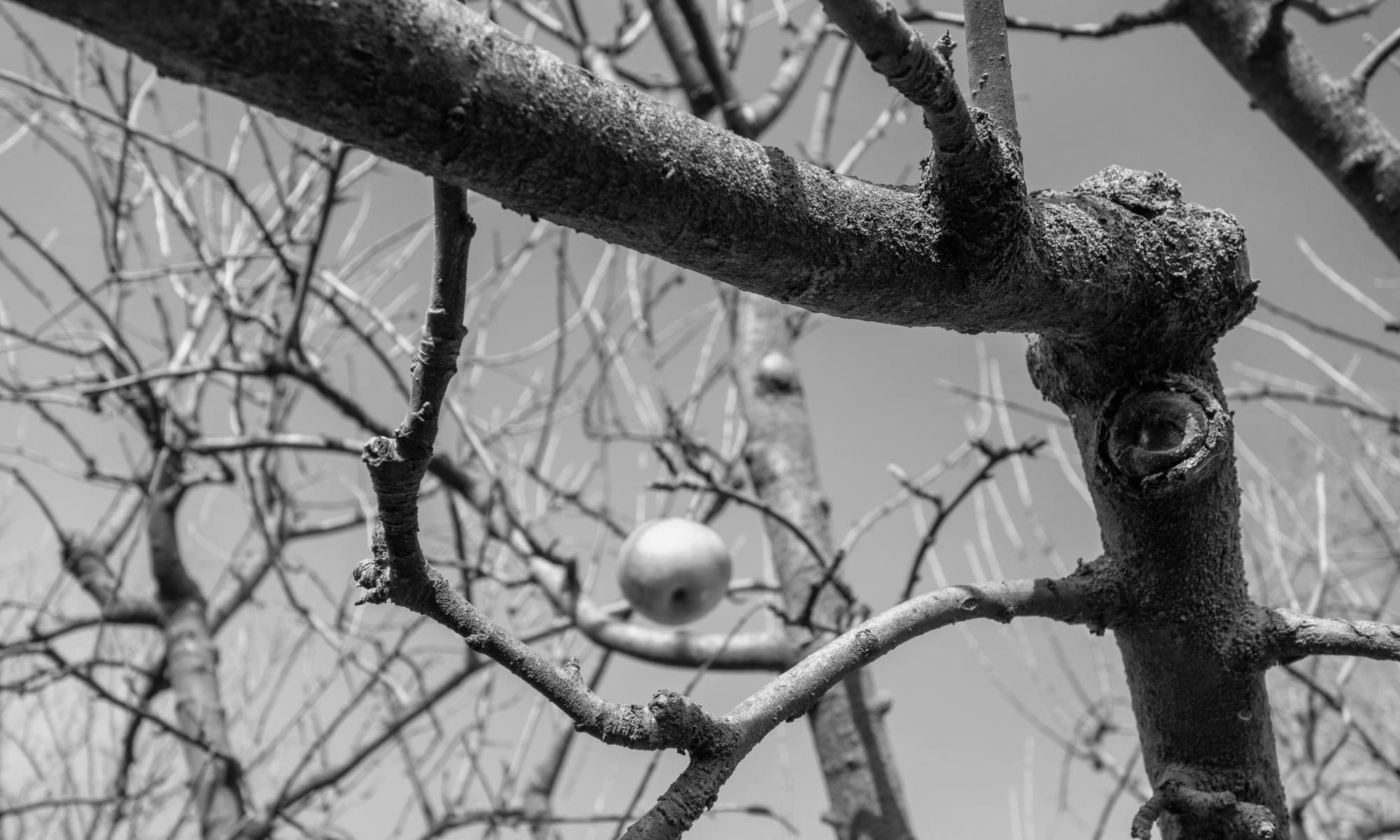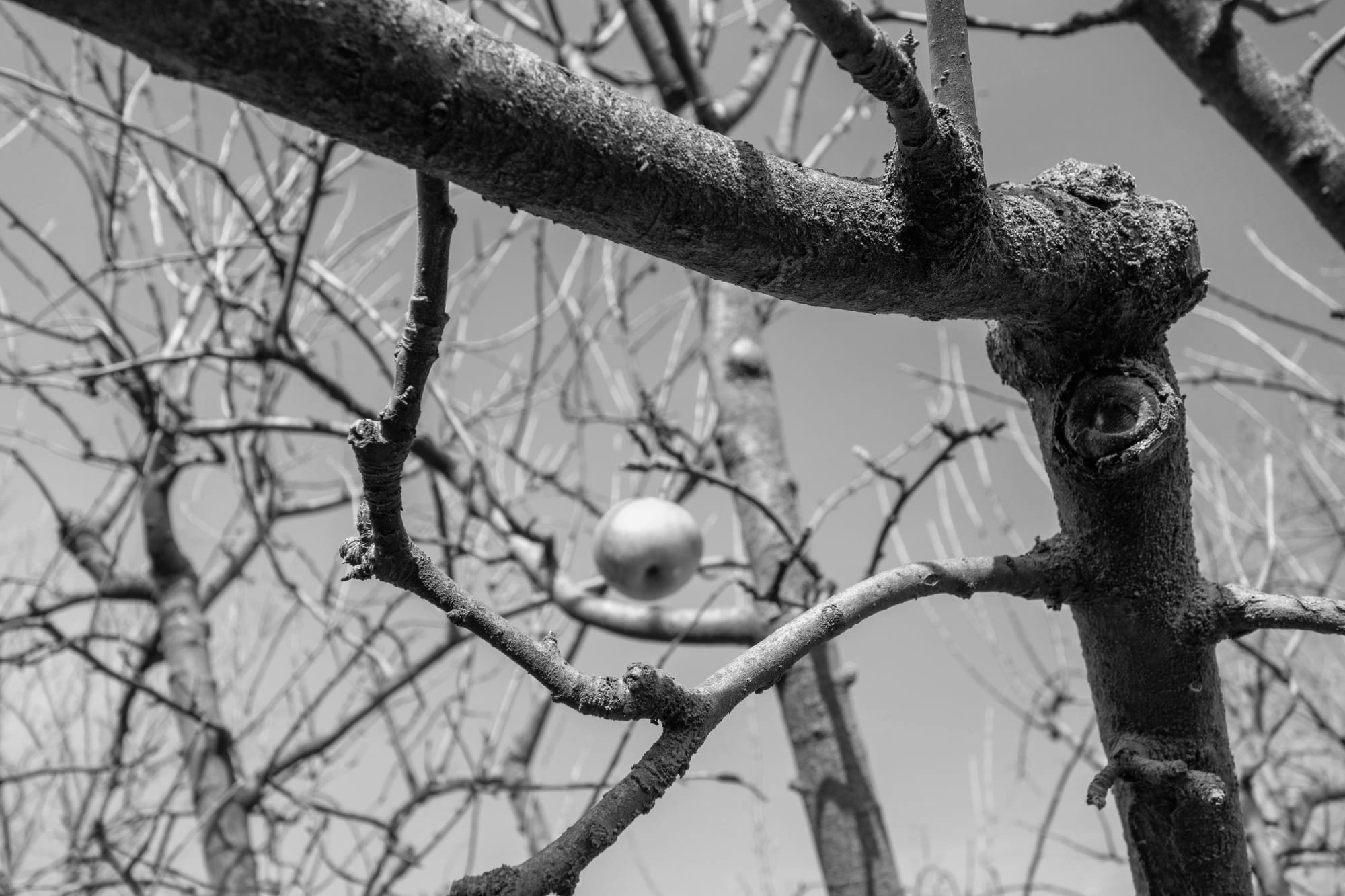Bad Seed
After the apple man came, things were good for a while.

Bad Seed

After the apple man came, things were good for a while.
John was his name, and though I was only a hairsbreadth from ten years when he passed through town, I remember him well. His great grey beard hid a mouth in constant motion with affable monologues. He kept a sauce pot on his head, which served him both as a hat and tool on his travels. A camper never goes hungry that carries his utensils as attire, I s’pose.
He was barefoot, and famous for it. Some said he’d walk for miles that way, even in the snow; but I must confess, when I saw him in winter, he was sensibly booted, like the rest of us. Can’t live long enough to be a legend, acting legendarily foolish. Still there’s a larger truth in the image. John tended toward pauper’s clothes, even though word was he was quite well off. I s’spect he knew he’d be more welcome as a jolly wanderer than some agricultural speculator.
He carried appleseeds in his pockets. Wild apples, for he was against unnatural grafting of the Lord’s flora. As a farm child, I can tell you, raising crops from seed is doing things the hard way. Most seed lands on shallow ground. Still, he’d sow so many that some naturally found their way to a fertile home. Contrary to what you may’ve heard, he owned many of the parcels he cultivated with apple trees, but he never begrudged us kids a sample or two. Of course, wild apples are a fruit of a different flavor than those what go in pies, and having had my share, I can tell you – in God’s natural form, they’re mostly food fit for hornets, as they rot in piles beneath that which spawned them.

However, they are good for making applejack and other such imbibements. I’ve lived my life as a child and I’ve lived my life as a young man, and having tasted wild apples in both forms, I say give me the cider.
Lately, the harder the better.
Because, after the apple man, came the other one. The man with the vines.
His manner was also affable, his look humble, but a light never seemed to dance in his eyes. Crows feet framed them, but any smile that helped etch those tributaries was the inviting smile of the predator. Unlike John, his feet were never bare, even when he broke bread with us. I know, because I scrubbed his boot-mud from our good kitchen floor.
I recall that he told pa that – in addition to bearing the most delicious fruit – his vines enriched the soil. That, like evergreens, they grew through the winter, but unlike any other plant we’d known, they would wither and recede in summer, leaving fecund ground in their wake.
I was fifteen by then, old enough that the vine man’s promises seemed farfetched, even to my relatively-new eyes. I presumed adults could only be more cautious, but my father was never one to let a shortcut to success pass him by. He gave the man leave to sow our lands, as did so many others in our county.
I’ll give him this: the vines surely grew in winter. But they grew in spring as well, and summer and fall moreover. I’d be hard-pressed to reckon which season suited them best. In their infancy they crisscrossed the terrain, resembling nothing so much as a web of moss blanketing the soil like a net holding the land in, and keeping the sun and rain out. At least at that age, the vines could be cut. You’d have to cut them to sow any crop, and once cut, we planted as many rocks as rye – only deep stone walls would hold back the vines, and even so you’d need to keep a stern eye on the gaps to make sure none snuck through.
As they grew, even such measures began to seem futile. We lost a plough horse to exhaustion, trying to pull a blade to cut them. Then we lost a second. We were not wealthy enough to try a third.
The vines darkened the ground, like the enchanted border of a fairy-tale castle. Then they darkened the sky. While the apple trees had drawn hornets, hungry for fermented droppings, so too did the vines bring insects, though I could never tell whether the vines attracted them or if they sprung from the plants themselves. Farfetched as it seems, I’m inclined toward the latter. Strange to feel any affection for hornets, but I’ll allow them this: they mostly keep to themselves until provoked. Whereas these tiny black dots clotted the sun, covered any skin you were unwise enough to uncover yourself, and found their way into every bag and biscuit in our dwindling pantry.
The vines smelled like the air before a storm that never broke— which was ironical, because their worst feature was their terrible thirst. They choked the depth of our well in a solid mass, but that was only their most direct route to slake their need. They robbed the county’s groundwater, roots burrowing down through rock. Some neighbors put sheets up to catch the rain, but those that left them overnight would wake to find tendrils creeping up like long straws to sip. And once the vines claimed their portion, any water that remained was a grey slurry. To drink it was a game of courage. The prize, more often than not: regurgitation, and a greater thirst than before.
Mother had been taken from us by typhoid fever, several years before. Now she was taken a second time. The vines covered her grave, stealing her name on the marker above, as they no doubt consumed her remains below.
Father followed. I found him one morning in the barn. He hung from the rafters, at the end of a long tendril, coiled about his neck. Whether he killed himself or the plant had grown impatient with indirect measures and somehow ensnared him directly, I could not say. It does not matter. The vines killed him either way.
I cannot say if others suffered the same. I only know that, over time, the faces dwindled. As did the talk. Early on, folks’d run their tongues ragged discussing the plants — they wormed into our parley as surely as they’d invaded the rest. Of late, our remainders have gone silent, as if they fear the vines can eavesdrop, and know our hate for them.
Time was I dreamt of escape, but we what persist have waited too long — too committed to our broken dreams. Now I fear to even approach the borders of town, lest I find for certain what I know is there, and persistent hope is smothered like I know the road must be.
Over these years, as my life has grown as tied to the vines as the land, I’ve observed one constant. The vines have never borne fruit. Certainly not “the most delicious you’ll ever taste,” despite the promises of the empty man who brought them to our soil. I’ve never seen any whisper that they yield more than flies and drought.
Until this morning.
This morning, the sun’s first rays revealed a fruit of color I find hard to describe, growing in the center of what used to be town. It’s grown plump in one night’s time, looming as high as the overgrown houses encircling it, and it smells impossibly sweet – as is only befitting a fruit that has consumed our lands, lives, and hope to reach that ripe fullness.
Sweet as it smells, none of the insects swarming the land want to go near it. Still. I think I’ll take a bite.
What have I got to lose?

About the Author
Dan McCoy is an Emmy and Peabody award winning comedy writer, creator & co-host of the podcast The Flop House, and a contributing editor to Deathbed. He likes cats.
Read more of Dan's Deathbed stories.
Image Credits
- By bagl1998


